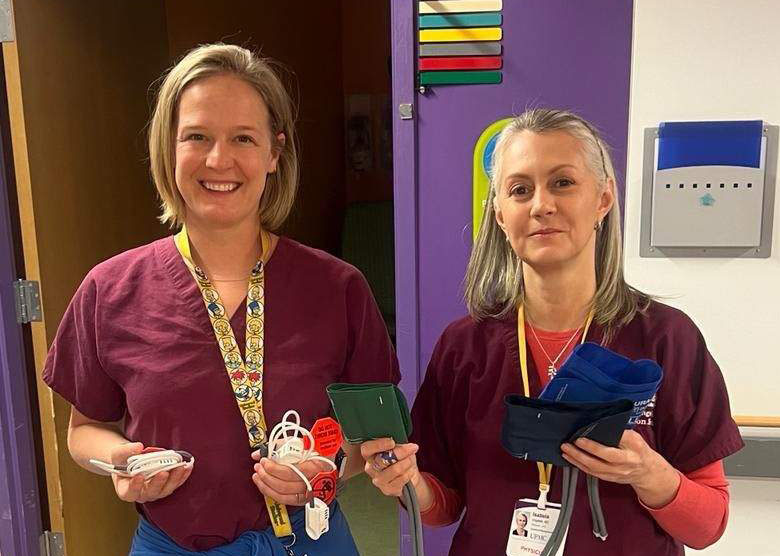
Back row, L to R: Maya Ragavan, MD, MPH, MD (C4CA, Pediatrics); Noe Woods, MD (C4CA, Obstetrics, Gynecology, and Reproductive Services); Holly Vogt (Director, UPMC Center for Sustainability); Jon Polley (Program Manager, UPMC Center for Sustainability)
When conversations about environmental sustainability arise, common images that come to mind include driving less in favor of public transit or walking, using electric vehicles, adopting reusable shopping bags, and planting trees at community events. However, these individual deeds are far from the only actions needed to face the challenge of climate change.
Clinicians and healthcare professionals are an often overlooked but critically influential group in the fight to fend off global warming. The healthcare industry is a significant contributor to climate change, with the US healthcare system alone accounting for an estimated 8-10% of the nation’s carbon dioxide (CO2) emissions. Globally, the healthcare industry is responsible for approximately 4.4% of the world's total greenhouse gas emissions.
Recognizing the urgent need for change, a dedicated coalition of clinicians in Pittsburgh was established on Earth Day 2022 under the banner of Clinicians for Climate Action (C4CA). Spearheaded by co-founder and co-chair Isabela Angelelli, MD, from our department (UPMC Children’s Hospital of Pittsburgh - CHP) and other leaders at UPMC, C4CA is a collective of healthcare professionals, over 580 members strong and growing rapidly, who are committed to mitigating greenhouse gas emissions originating from healthcare systems in Pennsylvania and beyond.
Our department has always been focused on reducing environmentally adverse effects of our healthcare practices. UPMC and the University of Pittsburgh School of Medicine formalized their commitment and dedication to responding to the climate crisis with impactful solutions by establishing the UPMC Center for Sustainability and the Pitt Office of Sustainability in the Health Sciences. In addition, UPMC signed the White House Health Care Sector Climate Pledge in the Fall of 2022, committing to cut organizational emissions in half by 2030 and achieve net-zero emissions by 2050. C4CA, our department, and UPMC have been working together to develop climate-smart healthcare innovations.
While C4CA primarily directs its efforts toward UPMC projects, it seeks collaborations with other healthcare systems. Even non-clinicians can get involved and are contributing to the mission. Together, the group aims to achieve shared objectives in reducing greenhouse gas emissions, fostering a sustainable future for healthcare practices and the planet. “Sustainability work is interdisciplinary teamwork,” asserts Dr. Angelelli. “If we don't communicate with our people who work in different professions within our system, we cannot make this happen. We need to start talking to each other.”
Members of C4CA have brainstormed, pitched, and executed numerous project ideas at UPMC. “The rule is: projects must be simple, must utilize excess capacity, cannot add work for individuals, must generate cost savings or not increase costs, must improve or maintain high standards of patient care, and must be thoroughly researched to demonstrate their impact,” explains Dr. Angelelli.
A key hotspot within the healthcare sector is the operating room (OR), where significantly high energy consumption and use of anesthetic gases, along with the use of disposable and single-use items and medical devices, add to the industry’s negative environmental impact. Many environmental sustainability projects center around the perioperative environment and have been guided by people in our department, including many of our anesthesiologists, CRNAs, fellows, residents, and staff members, as well as UPMC post-anesthesia care unit nurses, student nurse anesthetists, and anesthesia technicians. Our anesthesia techs in particular have played a pivotal role in many sustainability initiatives. Their responsibilities in OR operations and supply management give them a unique perspective on what supplies are being used and wasted, and they have enthusiastically launched, coordinated, and participated in projects.
A momentous environmental sustainability project that involves collaboration between many staff members in our department and UPMC perioperative services focuses on reducing the use of the anesthetic gases desflurane, isoflurane, sevoflurane, and nitrous oxide (N2O). These anesthetics are greenhouse gases that harm the environment, each with a global warming potential (GWP) much higher than that of CO2. Desflurane remains in our atmosphere for 10 years and has a GWP that is alarmingly 2,540 times worse than that of CO2. Just one 240ml bottle of desflurane generates emissions equivalent to the emissions from burning 988 pounds of coal. Isoflurane and sevoflurane remain in the atmosphere for 3.6 and 1.2 years, respectively, and have GWPs that are 510 and 130 times higher than that of CO2. N2O persists in the atmosphere for 114 years and has a GWP 310 times worse than that of CO2.
A combined effort between our department and the UPMC Center for Sustainability resulted in complete cessation of desflurane use throughout the entire UPMC health system in 2023. “The anesthesia techs were a key driver in phasing out desflurane at Children’s” explains Rhiannon Bordenick, Manager of the Anesthesia Technicians at CHP. The project’s focus has now shifted to the other harmful anesthetic gases; we utilize low flow anesthesia to help reduce our department’s overall carbon footprint, have launched a pilot project at UPMC Presbyterian, and are exploring implementation of the project at CHP and other UPMC hospitals. C4CA members from our department - Dr. Angelelli along with Franklyn P. Cladis, MD, MBA, FAAP (CHP); Joseph Ferriero, MSN, CRNA, and Elizabeth Ungerman, MD, MS, D.ABA (UPMC Presbyterian); and Miya Oliver, MD (PGY-2 resident) - are actively working on this project. Decreasing the use of these anesthetic gases by 50% at CHP alone has been estimated to bring in potential savings of around $116,000 per year and reduce carbon emissions by over 150 tons a year, which is equivalent to the annual emissions from 30 households.
Elaborating on pilot work on the low-flow anesthesia project at UPMC Presbyterian, Joe Ferriero shares, “I knew of low flow anesthesia and the hospital’s new absorbers, but no one had ever used it. It was just a practice change.” Joe dug deeper into his department’s purchasing data and made some calculations. “It shocked me how big our emissions were – close to 425 metric tons of CO2 a year,” explains Joe. At the 2023 CleanMed conference in Pittsburgh, Joe heard lectures from presenters who had leveraged data from their electronic medical records (EMR) on inhaled agents. This inspired Joe to start similar efforts through a department-supported clinical and translational research project with Harikesh Subramanian, MBBS, MS, D.ABA, ABPM-CI, (UPMC Presbyterian) and our perioperative data team - Jamie Artman, MSN, MBA, CRNA, (Director, Perioperative System Management and Operational Optimization) and Todd Wilkinson (Project Manager). The group is using EMR data to show the amount of system-wide carbon emissions based on inhaled agents. Low flow anesthesia administers less inhaled agent in a more efficient manner, achieving the same depth of anesthesia and the same or better end result for patients.
C4CA member Jill Pruszynski, MSN, CRNA, (UPMC Magee-Womens Hospital) says that UPMC’s Enhanced Recovery Program (ERP) protocols that recommend the use of total intravenous anesthesia (TIVA) instead of anesthetic gases have also helped to make a positive environmental impact across the health system. While the primary purpose of the ERP protocols is to improve patients’ surgical experience by helping them recover faster with better outcomes, the TIVA protocols had the secondary positive impact of cutting greenhouse emissions. “Magee in particular uses many of the protocols, and we have reduced the use of these gases by a rough estimate of 75% over the past several years,” says Jill. The protocols were developed by UPMC’s ERP team, directed by Stephen A. Esper, MD, MBA, in our department and Jennifer M. Holder-Murray, MD, FACS, in the Department of Surgery.

Another department-led project focuses on transitioning from single-use to reusable pulse oximetry probes. Dr. Angelelli partnered with engineers from the University of Pittsburgh Mascaro Center for Sustainable Innovation to analyze the carbon footprint and environmental impact of the single-use pulse oximetry probes. Results showed that the single-use probes have 35 times more GWP than the reusable ones. The project began in the CHP radiology unit, which had been using an average of 636 single-use probes every month. The CHP anesthesia techs pointed out how much we were spending on these single-use devices, helping to push CHP to reusable devices instead. The project expanded from the CHP radiology unit to the CHP OR, as well as the gastrointestinal lab at UPMC Presbyterian. A team of over 200 individuals is working together to make this project successful. Use of the single-use probes fell by 65% from June 2022-June 2023 in the CHP radiology unit, saving the department at least $15,000 and 208.02 Kg CO2e just over that first year. The initiative’s lead team is currently working to publish their findings in a high-impact journal.
A similar department project involving our CHP clinicians Dr. Angelelli, Cristina Roosen-Marcos, MD, and Julianna Watenpool, MSN, CRNA, strives to decrease the use of disposable blood pressure cuffs by 90% per year and transition to reusable cuffs. This would save nearly $17,000 and 1,900 Kg CO2e and divert 300 kg from landfills annually for the CHP radiology unit, where the project began. This wasted energy could charge over 200,000 smartphones or fuel a gas-powered car for 5,000 miles. To offset the carbon emissions from this practice, over 30 trees would need to be grown for an entire decade. The UPMC Center for Sustainability is now piloting this project at two additional hospitals in the health system and plans to expand the project to additional sites.
Looking ahead, the UPMC Center for Sustainability is poised to tackle additional perioperative challenges, including optimizing UPMC’s HVAC systems (heating, ventilation, and air conditioning) to minimize energy consumption without compromising patient care. Dr. Angelelli points out that HVAC system use in the OR is one of the hospitals biggest energy consumers. Regulations dictate that the air must be circulated 20 times an hour, necessitating continuous run of the HVAC system. “When the OR is empty, it could be decreased to just 10 to seven cycles per hour. If you have a surgical center that is closed on weekends, you don't need to be running the HVAC system at 20 cycles per hour 24/7 and over the entire weekend,” she explains. UPMC is exploring installing sensors that would automatically turn the system on and off when people enter and leave the OR.
C4CA’s efforts have garnered widespread recognition, including being named among the top 10 finalists in the 2024 American Leadership Climate Awards, underscoring the significance and impact of their work in advancing environmental sustainability within the healthcare sector. Many C4CA members have appeared in television, radio, and online news media.
To learn more about all of the incredible efforts to decrease the carbon footprint at UPMC and to get involved, please watch the below video and visit the websites for Clinicians for Climate Action and the UPMC Center for Sustainability.
UPMC employees can join the UPMC Center for Sustainability Viva Engage page* to share ideas and thoughts and stay updated on the sustainability work happening at UPMC. Dr. Angelelli emphasizes that joining the Viva Engage group “is a big contribution. It is a powerful way to let our healthcare system know that we care about this work.”
* Please note that this link is accessible only using UPMC login credentials.
